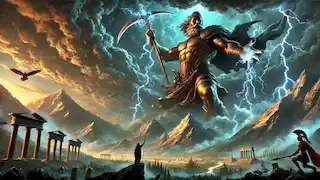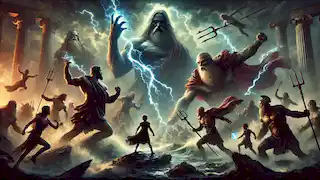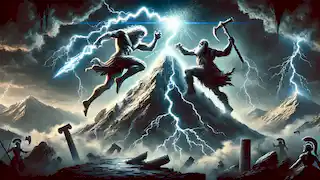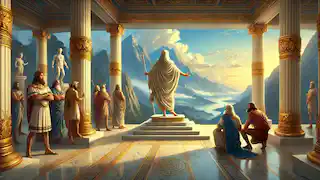The Tale of the Titans
Reading time: 8 min

About this story: The Tale of the Titans is a Myth from Greece set in the Ancient This Dramatic tale explores themes of Good vs. Evil and is suitable for All Ages. It offers Cultural insights. The epic clash between titans and Olympians for cosmic rule.
The heavens trembled, and the earth quaked as ancient forces battled for dominion over the cosmos. The titans, primordial beings of immense power, were the first rulers of the world, long before the age of the Olympian gods. Their story is one of creation, conflict, and eventual downfall, a tale that echoes through the annals of Greek myth with its grandeur and its tragedy.
Long before the birth of Zeus and the Olympians, the universe was a formless chaos. From this void came the primordial deities, Gaia, the Earth, and Uranus, the Sky. Together, they gave birth to the titans, powerful deities who would shape the cosmos. Among these titans were the twelve siblings who would come to dominate the heavens and the earth—Oceanus, Coeus, Crius, Hyperion, Iapetus, Theia, Rhea, Themis, Mnemosyne, Phoebe, Tethys, and the most fearsome of them all, Cronus.
Cronus, the youngest of the titans, harbored a deep resentment for his father, Uranus, who despised his children and imprisoned them deep within the bowels of the earth. Gaia, enraged by the treatment of her children, crafted a plan of vengeance and sought Cronus' help. She forged an unbreakable sickle from the earth itself and presented it to Cronus, urging him to overthrow his tyrannical father.
With the sickle in hand, Cronus lay in wait. On a moonless night, when the stars glowed faintly in the sky, Cronus ambushed Uranus. In a violent act of rebellion, Cronus castrated his father, casting Uranus' severed parts into the sea. From the blood of Uranus, new deities were born—the Furies, the Giants, and the Nymphs. The sky, forever wounded, withdrew, giving way to the reign of the titans, with Cronus as their supreme ruler.
But this was only the beginning of the tale. The world had changed, yet darkness loomed on the horizon, for Cronus' reign was far from peaceful.
The Prophecy of Cronus
Cronus ruled with an iron fist. His siblings, the titans, each governed different realms of the cosmos. Oceanus, the eldest, ruled the endless seas; Hyperion controlled the sun and its radiant light; Coeus was the god of intelligence and foresight; and the others, each in their dominion, ensured the balance of the universe.
However, a shadow lingered over Cronus' rule. Before his defeat, Uranus had prophesied that Cronus, too, would be overthrown by one of his own children. This prophecy haunted Cronus, filling his heart with dread. Determined to prevent his downfall, he resolved to devour each of his children as soon as they were born.
Cronus married his sister, Rhea, and together they had many offspring. Yet, as each child came into the world, Cronus swallowed them whole—Hestia, Demeter, Hera, Hades, and Poseidon—all met the same fate. Rhea, heartbroken and desperate, could not bear to see another child lost to Cronus' insatiable hunger. When she was pregnant with their sixth child, Zeus, she devised a plan to save him.

Rhea gave birth to Zeus in secret and entrusted him to the care of nymphs on the island of Crete. To deceive Cronus, she wrapped a stone in swaddling clothes and presented it as the newborn. Cronus, blinded by fear and paranoia, swallowed the stone without suspicion. Zeus, hidden away, grew strong under the watchful eyes of his caretakers, preparing for the day when he would fulfill the prophecy and challenge his father.
The Rise of Zeus
Years passed, and Zeus matured into a mighty god, filled with wisdom and power. Guided by Gaia and the nymphs, he knew it was time to confront his father. But to defeat Cronus, Zeus needed allies—those who had suffered under his father’s cruel rule. Zeus sought the counsel of his grandmother, Gaia, who advised him to free his siblings from Cronus' belly.
Disguised as a servant, Zeus infiltrated Cronus' palace and offered him a potion, a concoction designed to induce violent vomiting. Cronus, unaware of the plot, drank the potion, and soon after, his body convulsed. One by one, Cronus regurgitated Zeus' siblings—Hestia, Demeter, Hera, Hades, and Poseidon—fully grown and brimming with fury.
Zeus, with his siblings by his side, declared war on Cronus and the titans. This war, known as the Titanomachy, would shake the foundations of the cosmos.
The Titanomachy
The Titanomachy was a war of unimaginable scale, lasting ten long years. On one side were the titans, led by Cronus, and on the other, the Olympians, led by Zeus. The earth trembled, and the heavens shook as the two sides clashed in ferocious battles.
Zeus and his brothers, Hades and Poseidon, each wielded formidable power. Zeus controlled the thunder and lightning, Poseidon commanded the seas, and Hades ruled over the underworld. Together, they were an unstoppable force. However, Cronus and his fellow titans were ancient, wise, and strong, making the outcome of the war uncertain.

The Olympians sought the help of the Cyclopes and the Hecatoncheires, who had been imprisoned by Cronus in the depths of Tartarus. The Cyclopes, grateful for their freedom, gifted Zeus the thunderbolt, Poseidon the trident, and Hades the helm of invisibility—each a weapon of immense power. Armed with these divine gifts, the Olympians launched a final assault on the titans.
On the final day of battle, Zeus hurled his thunderbolts with unrelenting fury, striking down the titans one by one. The earth quaked, and the skies darkened as the titans fell, their once-mighty forms crashing into the mountains and seas.
The Fall of Cronus
Cronus, though weakened, refused to yield. He confronted Zeus in a final, desperate duel atop Mount Othrys, the stronghold of the titans. The mountain peak crackled with energy as the two deities clashed, their powers lighting up the sky.

Cronus, wielding the sickle that had once overthrown Uranus, fought with all his might, but Zeus was relentless. With a mighty strike of his thunderbolt, Zeus shattered the sickle, and Cronus fell to his knees, defeated at last.
With Cronus' fall, the age of the titans came to an end. Zeus and his siblings had emerged victorious, and the Olympians were now the rulers of the cosmos. Cronus and the titans were imprisoned in the depths of Tartarus, a prison so deep that escape was impossible. The world had changed once more, and a new era of gods had begun.
The Age of the Olympians
Zeus, now the ruler of the heavens, established his throne on Mount Olympus, the highest peak in Greece. His brothers, Poseidon and Hades, ruled beside him, Poseidon governing the seas and Hades reigning over the underworld. The Olympians brought order to the world, shaping the lands, the skies, and the seas according to their will.
However, the scars of the Titanomachy remained. The titans, though imprisoned, were not forgotten. Their presence loomed in the memories of the gods, a reminder of the price of power and the fragility of rule.

In the years that followed, the Olympians faced many challenges, from the rise of monstrous creatures to the defiance of mortals. But the lessons of the titans' fall remained etched in the fabric of the cosmos—a reminder that even the most powerful rulers could be overthrown, and that the cycle of power, once set in motion, would continue for eternity.
The tale of the titans is not just a story of war and victory, but one of legacy. For in every age, whether in the time of the titans or the rule of the Olympians, the forces of creation and destruction continue their eternal dance, shaping the destiny of gods and mortals alike.
Epilogue: The Eternal Struggle
The story of the titans did not end with their imprisonment. In the deep recesses of Tartarus, their spirits continued to burn with rage and defiance. It is said that one day, the titans will rise again, and the cycle of conflict will begin anew. Until then, their legacy endures, woven into the fabric of the earth, the sky, and the sea.
The Olympians, ever vigilant, know that their reign is not eternal. They too must guard against the same fate that befell the titans. For in the vast, ever-changing cosmos, power is fleeting, and even the gods are not immune to the passage of time.
Thus, the tale of the titans serves as both a warning and a lesson—a tale of the rise and fall of gods, of the delicate balance of power, and the eternal struggle that defines existence.


















